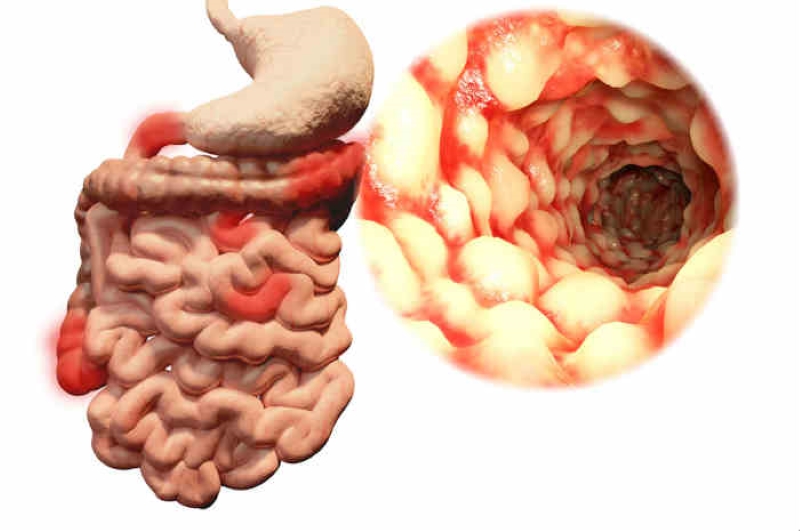
Crohn's disease: definition, symptoms, causes, diagnosis and treatment
An increasingly common disease today: formerly known as Crohn’s disease, Crohn’s disease is one of the most common chronic inflammatory bowel disease (IBD)
What is Crohn’s disease?
Crohn’s disease is a disease characterised by chronic inflammation of the intestine, which can affect the wall of the entire gastrointestinal tract, from the mouth to the anus.
In most cases, the disease mainly affects the ileum, the last part of the small intestine, and the colon.
What are the causes of Crohn’s disease?
The exact causes of Crohn’s disease are still being studied, as we are dealing with a multifactorial disease with only partially known causes.
It is believed that this disease is caused by an incorrect immune response of the intestine to certain antigens, such as bacteria or their components that are usually found in the intestine.
It is common to find this disease in people who have a genetic background or predisposition, however, this does not necessarily mean that it is hereditary.
Symptoms of Crohn’s disease
Crohn’s disease is typically characterised by symptoms such as:
- persistent diarrhoea lasting more than four weeks
- abdominal pain
- cramps, sometimes accompanied by bleeding
- fever
- joint pain
- weight loss
- in some cases fistulas or abscesses may develop around the anus
It is possible that certain joint, skin, eye and liver problems are related to Crohn’s disease.
These are immune-mediated conditions that go beyond the digestive system and can, in some cases, develop even before the typical symptoms of the disease appear.
Timing is crucial for people with Crohn’s disease
Early diagnosis can allow personalised treatment plans to be established, increasing the likelihood of successful management of the disease.
Crohn’s disease is often diagnosed late, as it can be confused with irritable bowel syndrome (also because 30% of patients have both).
Patients may then get used to living with a reduced quality of life and therefore postpone a check-up even if they experience symptoms such as multiple episodes of diarrhoea per day.
Crohn’s disease: How is it treated?
To accurately assess the presence of Crohn’s disease, the gastroenterologist will combine the physical examination with a series of instrumental tests, including ileocolonoscopy, abdominal ultrasound, MRI and blood tests.
After the disease has been diagnosed, the doctor will determine the best course of treatment depending on the severity and stage of the disease.
Conventional or advanced therapies may be recommended to maintain control of the disease and stop further damage to the intestine.
Today, a ‘treat to target’ strategy is used, i.e. a form of treatment that focuses on improving symptoms, test results and restoring the integrity of the intestinal mucosa.
This approach is adapted as needed during follow-up and may also require changes to the treatment plan.
In some situations, medication alone is not sufficient and surgery is necessary.
Read Also
Emergency Live Even More…Live: Download The New Free App Of Your Newspaper For IOS And Android
Pseudomembranous Colitis: Causes, Symptoms, Diagnosis, Therapy, Complications, Prognosis, Mortality
Differences Between Ulcerative Colitis And Crohn’s Disease
Dysphagia: Definition, Symptoms And Causes
Ulcerative Colitis: Causes, Symptoms And Treatment
Crohn’s Disease: What It Is And How To Treat It
Colitis: Symptoms, Treatment And What To Eat
Wales’ Bowel Surgery Death Rate ‘Higher Than Expected’
Irritable Bowel Syndrome (IBS): A Benign Condition To Keep Under Control
Colitis And Irritable Bowel Syndrome: What Is The Difference And How To Distinguish Between Them?
Irritable Bowel Syndrome: The Symptoms It Can Manifest Itself With
Crohn’s Disease Or Irritable Bowel Syndrome?
USA: FDA Approves Skyrizi To Treat Crohn’s Disease
Crohn’s Disease: What It Is, Triggers, Symptoms, Treatment And Diet
Gastrointestinal Bleeding: What It Is, How It Manifests Itself, How To Intervene
Faecal Calprotectin: Why This Test Is Performed And Which Values Are Normal
What Are Chronic Inflammatory Intestinal Diseases (IBD)?
Chronic Inflammatory Diseases: What They Are And What They Involve
Obstructed Defecation: How It Manifests Itself And How To Treat This Form Of Chronic Constipation
Dyspepsia: What It Is, Symptoms, Diagnosis And Treatment
Esophagitis: Symptoms, Causes And Treatment
Gastro-Oesophageal Reflux: Symptoms, Diagnosis And Treatment
Functional Dyspepsia: Symptoms, Tests And Treatment
Straight Leg Raise: The New Manoeuvre To Diagnose Gastro-Oesophageal Reflux Disease
Gastroenterology: Endoscopic Treatment For Gastro-Oesophageal Reflux
Oesophagitis: Symptoms, Diagnosis And Treatment
Asthma, The Disease That Takes Your Breath Away
Gastroesophageal Reflux: Causes, Symptoms, Tests For Diagnosis And Treatment
Global Strategy For Asthma Management And Prevention
Paediatrics: ‘Asthma May Have ‘Protective’ Action Against Covid’
Esophageal Achalasia, The Treatment Is Endoscopic
Oesophageal Achalasia: Symptoms And How To Treat It
Eosinophilic Oesophagitis: What It Is, What The Symptoms Are And How To Treat It
Gastroesophageal Reflux: Causes, Symptoms, Tests For Diagnosis And Treatment
Irritable Bowel Syndrome (IBS): A Benign Condition To Keep Under Control
What Is Esophagogastroduodenoscopy?
Esophagogastroduodenoscopy (EGD Test): How It Is Performed
Symptoms And Remedies Of A Gastro-Oesophageal Reflux Cough
Gastro-Oesophageal Reflux Disease (GERD): Symptoms, Diagnosis And Treatment
Indigestion Or Dyspepsia, What To Do? The New Guidelines


